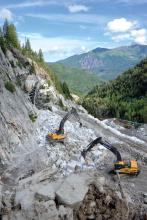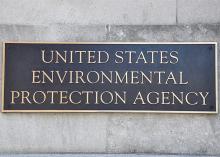The U.S. Army Corps of Engineers has determined that the operators of a Colorado marble quarry violated the Clean Water Act when they diverted a tributary of the Crystal River to make way for a mining road.
In the fall of 2018, Colorado Stone Quarries, which operates Yule Quarry just outside the town of Marble Colorado, diverted Yule Creek from its natural channel.
According to a report on the local Post Independent website, operators piled the original streambed with fill material, including marble blocks.
The operation was done without the proper permits or oversight, according to the Army Corps.
Under Section 404 of the Clean Water Act, a project requires a permit from the Army Corps if it includes the discharge of dredged or fill materials into waters such as rivers, streams and wetlands.
CSQ did not obtain a permit for the project because company officials thought the work was exempt, citing the temporary nature of the access road and creek diversion.
“The work performed does not qualify for an exemption,” states a March 5 2020 letter from Army Corps Colorado West Section chief Susan Nall, as the work “is being utilized for purposes other than moving mining equipment (e.g., hauling mined marble, accessing other portions of the mine, fuel staging area, and performing spill cleanup and monitoring activities) as required by the applicable exemption.”
Nall’s letter concludes: “The work is a violation of the Clean Water Act.”
In order to remedy the situation, the Army Corps wants Yule Creek returned to its original alignment.
“Our preference is always to preserve the physical waterway if possible,” Nall said.
CSQ is considering a few different alignments for Yule Creek.
“The current alignment does accomplish the goal of creating separation between the creek and mining activities, which benefits the watershed,” CSQ general manager Daniele Treves said in a prepared statement.
The company plans to apply for an “individual permit,” which will require a 30-day public notice, public review and comments. The final decision on the Yule Creek alignment rests with the Army Corps.
The diversion of Yule Creek came to the attention of Army Corps staff after a diesel spill in October 2019, which released roughly 5,500 gallons of fuel from storage tanks onto the ground.
Although CSQ notified the Army Corps in 2018 that it was planning to divert about 1,500 feet of the creek, the company didn’t follow the proper procedure, and the Army Corps didn’t realize the scope of the work envisaged, according to Nall.
“We did not realize it was a formal request for concurrence of an exemption,” Nall said.
“That might have been an error on our part. … We didn’t object, and they took it as a concurrence. Nothing is exempt until we say it is. They really should have obtained it from us in writing.”
The board of the Colorado Division of Reclamation, Mining and Safety (DRMS) has levied a $18,600 penalty for the October spill.
The accident resulted in the quarry’s violation of three state statutes: unauthorized release of pollutants into groundwater, failure to minimize disturbance to water quality and failure to comply with the conditions of the permit.
DRMS determined that last September’s relocation of generators and the diesel-fuel tanks that supplied them was not approved and was a violation of CSQ’s permit. The diesel tanks were not put in secondary containment structures.
CSQ has agreed to pay the fine.
“We are always more interested in gaining compliance than the monetary aspect of it,” said Russell Means, minerals program director for DRMS.
According to an agreement between quarry operators and state regulators, CSQ will also continue to clean up the site, including bioremediation treatments to remove hydrocarbons from the soil and long-term water-quality monitoring.
Means and Nall both said that CSQ has been cooperative throughout the process.
“I think everybody’s interest is the same — we would all like to see the spill area cleaned up and the best thing for Yule Creek,” Nall said.
The quarry, now known as The Pride of America Mine, is owned by Italian company Red Graniti and employs about 30 to 40 people. According to CSQ, there are enough marble reserves contained in its six galleries to continue mining at the current rate for more than 100 years.





